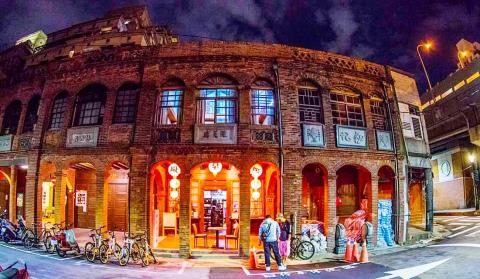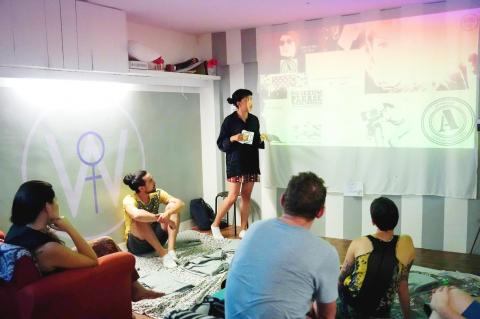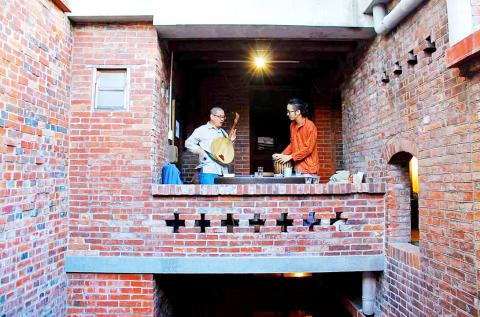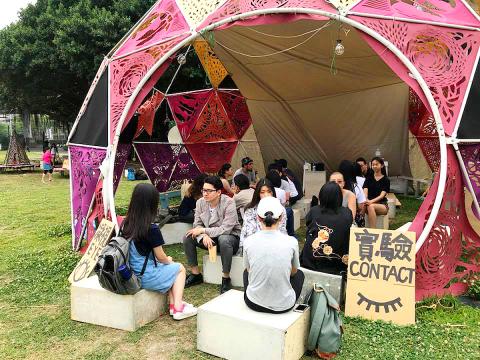“Wet pussy” is on the menu at a rummage sale at Mowes, as attendees sift through clothes in a basement on a Saturday afternoon.
“It’s pretty much a sangria, which has secret ingredients that make it magical and extra wet,” quips event co-organizer Kai Hsieh (謝鎧安) of the scarlet cocktail.
A floor up in a space adorned with drawings of the female anatomy and messages of empowerment, Hsieh and other women are discussing the theme for their upcoming “women’s tea time:” masturbation. Topics include getting into the mood, sex toys and the guilt.

Photo courtesy of Ivy Palace
On the same afternoon in a 100-year-old building across town, a European kung fu master teaches Wing Chun to neighborhood moms while a Taiwanese Djembe (a type of African drum) musician prepares an Indian curry feast.
Such unconventional “spaces” have been popping up everywhere in Taipei. From 120 Grassroots, a now-closed artist settlement of huts, tents and other structures on a lawn off Taipei’s Civic Boulevard, to Mowes, a tiny two-floor women’s empowerment establishment in an alley near the Gongguan (公館) business area, what connects these spaces is their grassroots nature and decentralized, experimental programming where people can be both organizer and participant.
Yang Tzu-chieh (楊子頡), Indian curry chef and cofounder of Ivy Palace (草御堂), a crafts store, artist village and event space in an old brick house on Dihua Street (迪化街), says that Taiwan’s shift toward a knowledge-based economy has reached the point where people are breaking from established systems to explore new cultural possibilities.

Photo courtesy of Tim Hsieh
“There are many young people who want to create new values within the existing framework, which will lead to more and more spaces like these,” Yang says.
ANTI-HUASHAN
Run by Unregulated Masses (野青眾), an alternative events collective, 120 Grassroots’ three-month run was cut short on Monday after news broke of a grisly murder committed by an archery instructor who had built a wooden hut on the site.

Photo courtesy of Ivy Palace
Organizers say that the instructor was not part of their team and submitted an application to receive an activity space.
However, public discontent over the grassland, which has been frequently criticized by its neighbors due to security, cleanliness and noise issues, boiled over as the Chinese-language media jumped all over the incident with sensational headlines that focused on the negative aspects of the space rather than the killer.
120 Grassroots organizer Lee Ming-hung (李名紘) says the space strives to be the antithesis of its trendy retro-chic neighbor Huashan 1914 Creative Park.

Photo courtesy of 120 Grassroots
There are no fancy cocktail bars, pop-up fashion shops or arthouse movie theaters. It is reminiscent of a Burning Man-esque art festival, where people build whatever they need, sleep in tents, hold spontaneous events and even walk around naked. Like Burning Man, this settlement was ephemeral — Unregulated Masses leased it from the Taipei City Urban Regeneration Office until the end of this month.
“When people think of artists and creative culture these days, they think of places like Huashan — clean, organized, quiet, everyone is dressed normally,” Lee says. “We wanted to counter the ‘creative cultural’ industry and harken to the early days of Huashan when artists lived there.”
Lee, a veteran events organizer, says the biggest adjustment to running such a space is to learn when and when not to interfere.
“My usual thought processes are not applicable in a place that rails against the system,” he says. “Anyone can hold an event here as long as there is space and we are notified. We try to regulate as little as possible — if an event goes too late, we’ll just tell them to be quieter.”
It may have been controversial, but for the few months it was around, 120 Grassroots stretched the experimental space ethos as far as they could. With the ensuing backlash over the grisly murder it remains to be seen if there will ever be such a space like it again.
GIRL POWER
The main wall on the first floor of Mowes, which stands for Moving Women Establishment, is plastered with a “pussy wall” of vagina drawings and empowering messages such as: “I am beautiful because...”
Denmark-born and raised Maja Ho (候梅婷) established the space in October last year after noticing that her female relatives in Taiwan did not have the same kind of confidence that was instilled in her when she was growing up in Europe.
“I wanted to give back to them, to let them know that they’re beautiful and that they’re more than enough,” she says.
Empowerment, equality, celebrating differences and tackling taboos are the focus of the space’s organizers. Participants are made to feel safe and confident that issues discussed there will stay there.
“Women around the world instinctively compete against each other,” Ho says. “We want to break that so we can support each other and build each other up.”
The space’s signature event is the “women’s tea time,” where both local and foreign women get together and talk about seldom-discussed topics such as periods and sex toys.
But the space also depends on whatever talent is available. Zumba, yoga, clothing swaps and other community events have all been hosted there, and the space was the venue for several female empowerment-related films during the 1905 Human Rights Film Festival two weeks ago.
“We don’t have a set program,” Hsieh says. “It’s pretty organic.”
“Anyone who has an idea, who wants to teach, come,” Ho adds.
While many of the events are women-only, the movie screenings, for example, are for all comers, and Ho and Hsieh are considering starting a “men’s tea time” as men are even less likely to get together and talk about their feelings, much less talk about topics such as masturbation. After all, equality involves both genders putting in an effort.
“So many men have been reaching out, they want to know first of all how to empower women. How do they make their moms, their girlfriends, their beloved friends feel great?” Ho says. “Also, how to talk to their guy friends about their feelings, and to feel more safe to be vulnerable.”
NEW IN OLD
Yang had expected the foreigner-taught Wing Chun class to attract mostly younger males and kung-fu fans, but instead the students ended up being mostly neighborhood mothers. This, he says, is an example of what happens when he brings different people together at Ivy Palace dinner gatherings — the pottery teacher spoke to the kung fu teacher and espoused certain emotional and physical health benefits of Wing Chun on his Facebook — which led to many of his older female students to start attending the class.
Yang says that instead of doing something too radical, he would rather people use sustainable business methods to “occupy” more spaces in the city. In tune with Ivy Palace’s location in historic Dadaocheng (大稻埕), Yang welcomes activities that update traditional culture: taking old Hoklo tunes, for example, and reinterpreting them in jazz.
“People visit the neighborhood for nostalgia, but in fact 100 years ago this was the happening spot in Taipei,” he says. “The trendiest items could be found here, floating down the river from Tamsui.”
Cofounder Kaya Hanasaki says she looks for artists interested the area and encourages them to create works that incorporate local Dadaocheng elements, including old photos, fabric and traditional medicine.
Having just opened its doors in November last year, both Yang and Hanasaki say that the place is far from finished. The next step is to reach out to the community and find ways to collaborate with the creative and traditional businesses in the area.
“I want this space and its projects to dig out and revalue the things we have,” Hanasaki says. “I want people to be free from the old systems and see new possibilities and something better.”

The primaries for this year’s nine-in-one local elections in November began early in this election cycle, starting last autumn. The local press has been full of tales of intrigue, betrayal, infighting and drama going back to the summer of 2024. This is not widely covered in the English-language press, and the nine-in-one elections are not well understood. The nine-in-one elections refer to the nine levels of local governments that go to the ballot, from the neighborhood and village borough chief level on up to the city mayor and county commissioner level. The main focus is on the 22 special municipality

The People’s Republic of China (PRC) invaded Vietnam in 1979, following a year of increasingly tense relations between the two states. Beijing viewed Vietnam’s close relations with Soviet Russia as a threat. One of the pretexts it used was the alleged mistreatment of the ethnic Chinese in Vietnam. Tension between the ethnic Chinese and governments in Vietnam had been ongoing for decades. The French used to play off the Vietnamese against the Chinese as a divide-and-rule strategy. The Saigon government in 1956 compelled all Vietnam-born Chinese to adopt Vietnamese citizenship. It also banned them from 11 trades they had previously

Hsu Pu-liao (許不了) never lived to see the premiere of his most successful film, The Clown and the Swan (小丑與天鵝, 1985). The movie, which starred Hsu, the “Taiwanese Charlie Chaplin,” outgrossed Jackie Chan’s Heart of Dragon (龍的心), earning NT$9.2 million at the local box office. Forty years after its premiere, the film has become the Taiwan Film and Audiovisual Institute’s (TFAI) 100th restoration. “It is the only one of Hsu’s films whose original negative survived,” says director Kevin Chu (朱延平), one of Taiwan’s most commercially successful

Jan. 12 to Jan. 18 At the start of an Indigenous heritage tour of Beitou District (北投) in Taipei, I was handed a sheet of paper titled Ritual Song for the Various Peoples of Tamsui (淡水各社祭祀歌). The lyrics were in Chinese with no literal meaning, accompanied by romanized pronunciation that sounded closer to Hoklo (commonly known as Taiwanese) than any Indigenous language. The translation explained that the song offered food and drink to one’s ancestors and wished for a bountiful harvest and deer hunting season. The program moved through sites related to the Ketagalan, a collective term for the